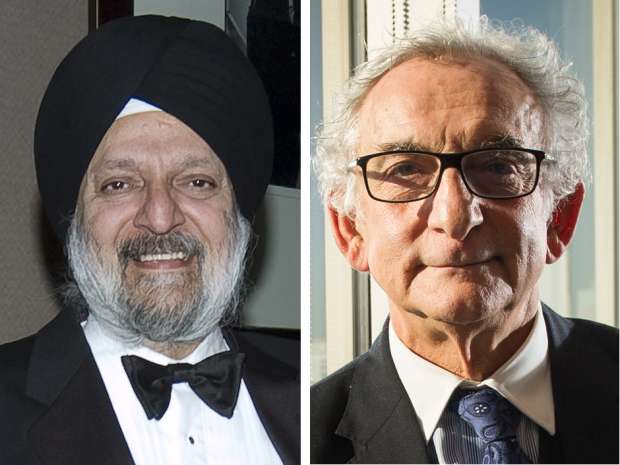Two Bay Street stalwarts are on the list of new Senate appointment recommendations Prime Minister Justin Trudeau unveiled Monday: Howard Wetston, former chair of the Ontario Securities Commission, and Sabi Marwah, who was a longtime senior executive of Bank of Nova Scotia.
Wetston, a former Federal Court of Canada trial judge and one-time chief executive of the Ontario Energy Board, retired last November from the OSC, where he had served as chair and CEO since 2010. In April, he joined Toronto-based law firm Goodmans LLP as counsel.
As head of the OSC, Canada’s largest capital markets regulator, Wetston beefed up enforcement by launching the Joint Serious Offences Team, a partnership between the OSC, the RCMP Financial Crime program and the Ontario Provincial Police Anti-Rackets Branch. He also put the wheels in motion for the creation of a paid whistleblower program, and a disclosure regime intended to promote more women on corporate boards and in senior management.
Dale Lastman, chair of Goodmans LLP, said he doesn’t yet know whether Wetston will be able to continue working with the law firm.
“If he can stay, we’ll be delighted to have him, and if he can’t stay, then we’ll be sad from one perspective but he’ll be helping our country from another,” Lastman said in an interview.
He said the former regulator has primarily been providing internal advice and mentoring at the firm.
“If smart and classy and nice and decent and caring and being passionate are qualities that would make a good senator, then Mr. Wetston will make a good senator, as would Mr. Marwah, who I also know,” Lastman said.
Marwah, who joined Bank of Nova Scotia as a financial analyst and climbed the ranks to the positions of vice-chairman and chief operating officer, retired in 2014 after 35 years at what is now Canada’s third-largest bank. The influential former bank executive has also served as a director on the boards of Torstar Corp., Cineplex Inc., George Weston Ltd., and Telus Corp.
Marwah’s official biography posted online by the Prime Minister’s office notes that he is from India, and that he has worked extensively over the past 15 years “to showcase the rich diversity of Sikh and South Asian art and culture.”
Warren Jestin, who was chief economist at Bank of Nova Scotia until his retirement in February, said Marwah’s range of experience in the business, health, and education sectors, including sitting on the boards of the Hospital for Sick Children and Ryerson Futures at Ryerson University, make him an obvious choice for the Senate.
“You think of him as a guy who ran the day-to-day operations of Scotiabank, be his interests and skills are far wider than that,” Jestin said in an interview.
Marwah and Wetston were recommended for Senate appointments alongside, Lucie Moncion, chief executive of the Alliance des caisses populaires de l’Ontario, Gwen Boniface, the first female commissioner of the Ontario Provincial Police, University of Toronto School of Public Policy professor Tony Dean, and Kim Pate, executive director of the Canadian Association of Elizabeth Fry Societies.
Trudeau’s six recommendations to the Governor General were chosen using a new merit-based process, which is intended to ensure that the Senate is “independent, reflective of Canada’s diversity, and best able to tackle the broad range of challenges and opportunities facing the country.”
For the first time, the process was opened to Canadians to apply, which generated more than 2,700 applications. The submissions were reviewed by an independent advisory board for Senate appointments, which then provided “non-binding” recommendations to Trudeau.




